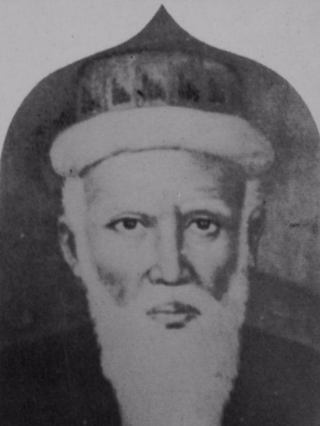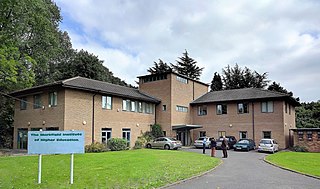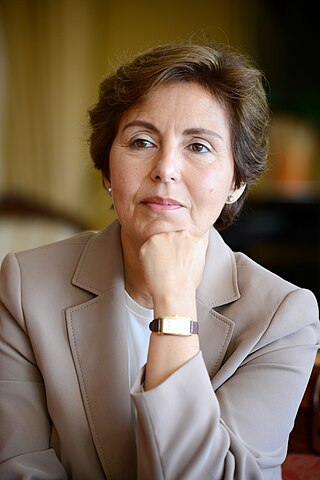Related Research Articles
Islamic studies refers to the academic study of Islam, which is analogous to related fields such as Jewish studies and Quranic studies. Islamic studies seeks to understand the past and the potential future of the Islamic world. In this multidisciplinary program, scholars from diverse areas participate and exchange ideas pertaining to the particular field of study.

The Royal Asiatic Society of Great Britain and Ireland, commonly known as the Royal Asiatic Society, was established, according to its royal charter of 11 August 1824, to further "the investigation of subjects connected with and for the encouragement of science, literature and the arts in relation to Asia." From its incorporation the society has been a forum, through lectures, its journal, and other publications, for scholarship relating to Asian culture and society of the highest level. It is the United Kingdom's senior learned society in the field of Asian studies. Fellows of the society are elected regularly and include highly accomplished and notable scholars of Asian studies; they use the post-nominal letters FRAS.

Sir Hamilton Alexander Rosskeen Gibb, known as H. A. R. Gibb, was a Scottish historian and Orientalist.
Vladimir Alekseevich Ivanow was a Russian orientalist. He was a scholar of Islam, with a particular focus on Ismailism. He graduated in 1907 and joined the faculty of Oriental Languages of the University of St. Petersburg.
Shams ad-Dīn adh-Dhahabī, also known as Shams ad-Dīn Abū ʿAbdillāh Muḥammad ibn Aḥmad ibn ʿUthmān ibn Qāymāẓ ibn ʿAbdillāh at-Turkumānī al-Fāriqī ad-Dimashqī was an Athari theologian, Islamic historian and Hadith scholar.
Franz Rosenthal was the Louis M. Rabinowitz Professor of Semitic Languages at Yale University from 1956 to 1967 and Sterling Professor Emeritus of Arabic, scholar of Arabic literature and Islam at Yale from 1967 to 1985.

Wilferd Ferdinand Madelung FBA was a German author and scholar of Islamic history widely recognised for his contributions to the fields of Islamic and Iranian studies. He was appreciated in Iran for his "knowledgeable and fair" treatment of the Shia perspective. In the obituary of the Institute of Ismaili Studies (London) where Madelung worked his last years, it reads: "With particular reference to religious schools and movements in early Islam, his studies, based on a vast array of primary sources, have enriched the discipline’s understanding of almost every major Muslim movement and community – not only early Imami Shi‘ism and the later developments of Twelver, Ismaili and Zaydi Islam but also the lesser known aspects of Sunni, Khariji and the Mu‘tazili schools of theology and philosophy."

Sir Jadunath Sarkar, was a prominent Indian historian and a specialist on the Mughal dynasty.

Michael Allan Cook FBA is a British historian and scholar of Islamic history. Cook is the general editor of The New Cambridge History of Islam.
Hugh Nigel Kennedy is a British medievalist and academic. He specialises in the history of the early Islamic Middle East, Muslim Iberia and the Crusades. From 1997 to 2007, he was Professor of Middle Eastern History at the University of St Andrews. Since 2007, he has been Professor of Arabic at SOAS, University of London.
Jamāl al-Dīn Abū al-Ḥajjāj Yūsuf ibn al-Zakī ʻAbd al-Raḥmān ibn Yūsuf ibn ʻAbd al-Malik ibn Yūsuf al-Kalbī al-Quḍā’ī al-Mizzī,, also called Al-Ḥāfiẓ Abī al-Ḥajjāj, was a Syrian muhaddith and the foremost `Ilm al-rijāl Islamic scholar.
Carole Hillenbrand, is a British Islamic scholar who is Emerita Professor in Islamic History at the University of Edinburgh and Professor of Islamic History at the University of St Andrews. She is the Vice-President of the British Society for Middle Eastern Studies and a Member of the Council for Assisting Refugee Academics.

Nuruddin ibn Ali ar-Raniri was an Islamic mystic and scholar from Rander in Surat province of Gujarat, in India, who worked for several years in the court of the sultan of Aceh in what is now Indonesia. He was the most prolific of the authors of the Acehnese court, and helped contribute to its international reputation as a center of scholarship. His work was considered the oldest Muslim scholarship of Southeast Asia.

A kuttab or maktab is a type of elementary school in the Muslim world. Though the kuttab was primarily used for teaching children in reading, writing, grammar, and Islamic studies, such as memorizing and reciting the Qur'an, other practical and theoretical subjects were also often taught. The kuttāb represents an old-fashioned method of education in Muslim majority countries, in which a sheikh teaches a group of students who sit in front of him on the ground. Until the 20th century, when modern schools developed, kuttabs were the prevalent means of mass education in much of the Islamic world.
The Chronicle of 1234 is an anonymous West Syriac universal history from Creation until 1234. The unknown author was probably from Edessa. The Chronicle only survives in fragments, from which it is known to be divided into two parts: the first on ecclesiastical history, the second on secular. It was critically edited and translated by the French Orientalist Jean-Baptiste Chabot in 1920 and by Albert Abouna in 1974.
Nāṣir al-Dīn Muḥammad b. ʿAbd al-Raḥīm b. ʿAlī al-Miṣrī al-Ḥanafī, better known as Ibn al-Furāt, was an Egyptian historian, best known for his universal history, generally known as Taʾrīkh al-duwal wa ’l-mulūk, though the manuscripts themselves call it al-Ṭaʾrīq al-wāḍiḥ al-maslūk ilā tarājim al-khulafā’ wa ’l-mulūk. Ibn al-Furat's work is of particular importance for modern scholars due to its high level of detail and the mostly verbatim use of a wide variety of sources, including Christian and Shia authors suspect to mainstream orthodox Sunni historiography. Some of these works survive only through Ibn al-Furat's reuse of them.
The Tarikh i Yamini, or Kitab i Yamini, written in Arabic in an embellished, flowery rhetorical rhymed prose, is a history of the reigns of Sebuktigin and Mahmud.

The Markfield Institute of Higher Education is an educational institution based in Leicestershire, in the United Kingdom. Specialising in Islamic subjects, the institute runs part-time and full-time courses, awarding BA and MA degrees validated by Newman University, and PhD degrees validated by the University of Gloucestershire. The institute is accredited by the British Accreditation Council, reviewed by the Quality Assurance Agency for Higher Education, and registered with the Higher Education Funding Council for England.

Gülru Necipoğlu is a Turkish American professor of Islamic Art/Architecture. She has been the Aga Khan Professor and Director of the Aga Khan Program for Islamic Architecture at Harvard University since 1993, where she started teaching as Assistant Professor in 1987. She received her Harvard Ph.D. in the Department of History of Art and Architecture (1986), her BA in Art History at Wesleyan, her high school degree in Robert College, Istanbul (1975). She is married to the Ottoman historian and Harvard University professor Cemal Kafadar. Her sister is the historian Nevra Necipoğlu.

Qiyān were a social class of women, trained as entertainers, which existed in the pre-modern Islamic world. The term has been used for women who were both free, including some of whom came from nobility, and non-free women. It has been suggested that "the geisha of Japan are perhaps the most comparable form of socially institutionalized female companionship and entertainment for male patrons, although, of course, the differences are also myriad".
References
- 1 2 Leeds, University of. "Profile - Faculty of Arts - University of Leeds - Fozia Bora". www.leeds.ac.uk. Archived from the original on 16 April 2017. Retrieved 16 April 2017.
- ↑ 'Recognising excellence: Our Women of Achievement 2021' (11 March 2021).
- ↑ "The Society's Prizes and Awards – Royal Asiatic Society". royalasiaticsociety.org. Archived from the original on 16 April 2017. Retrieved 16 April 2017.
- ↑ [LHRI], Vicky Smith. "Dr Fozia Bora wins The Staunton Prize". www.leeds.ac.uk. Retrieved 16 April 2017.
- ↑ Nicholas Morton, review of Fozia Bora, History in the Medieval Islamic World: The Value of Chronicles as Archives (London: I.B. Tauris, 2019), ISBN 978-1-7845-3730-2, Al-Masāq: Journal of the Medieval Mediterranean, 31 (2019), 367-69 doi : 10.1080/09503110.2019.1662598.